Football, often celebrated as the beautiful game, frequently exposes the stark disparities between preparation, experience, and mental resilience. In a recent UEFA Super Cup clash, Paris Saint-Germain’s dramatic comeback against Tottenham Hotspur once again highlighted that victory is rarely a product of fairness or equal footing. Instead, it underscores the importance of resolve, adaptability, and the unwavering belief that no matter how bleak the situation appears, hope remains alive until the final whistle. The match’s narrative was not just about technical skill; it was a testament to the unpredictable nature of sports, where fortune can favor the audacious and the resilient.
Disparity in Fitness and Preparation: A Critical Reflection
Luis Enrique’s candid assessment pointed to a fundamental issue that often undermines team performance — fitness levels and timing. PSG’s recent European commitments meant they had only just resumed training, a stark contrast to Tottenham’s six-week preparation, which appeared to translate into a more cohesive, confident performance. This discrepancy raises questions about how clubs prioritize preparation and the timing of key tournaments. Is it fair to compare a team fresh off a demanding international campaign with one still regaining tactical cohesion? The answer is complex but emphasizes that in high-stakes matches, stamina, rhythm, and mental freshness can often be the deciding factors.
The Myth of the ‘Underdog’: David vs. Goliath Narratives Are Overrated
The narrative spun around PSG’s late surge suggests a David-versus-Goliath scenario, but such storytelling obscures the underlying truths: resilience is sometimes mistaken for luck, and perceived underdogs can possess hidden strength. PSG’s two late goals, brought about by unrelenting effort and a refusal to capitulate, exemplify the power of never surrendering. Tactical flaws, like Chevalier’s mishandling in the early stages, reveal that success isn’t about flawlessness but about perseverance and mental toughness to withstand setbacks. Ultimately, PSG’s ability to fight back underscores the fact that great teams are often defined by their resilience, not their pristine execution.
The Role of Leadership and Mental Fortitude in High-Pressure Moments
Enrique’s praise for PSG’s players’ faith and the supporters’ unwavering belief highlights an often underestimated factor: leadership and collective mental strength. The ability to maintain faith during adversity is what separates champions from also-rans. Lucas Chevalier’s challenging debut and his subsequent display of character, especially by saving a penalty, reflect an emerging leader with a fierce will to succeed. It also emphasizes that mental fortitude can sometimes compensate for technical deficiencies, fostering a team culture where setbacks are viewed as opportunities for growth rather than definitive failures.
The Super Cup spectacle reaffirmed a timeless truth: in football, resilience, attitude, and mental strength can override technical errors and fitness gaps. While talent remains vital, it is the relentless pursuit of victory—embodying hope even in the face of despair—that truly defines greatness. PSG’s comeback was more than just a match victory; it was a demonstration of how the indomitable human spirit can challenge odds, rewrite narratives, and turn the improbable into reality. In an era of increasing commercialization and focus on individual brilliance, this game reminded us that true winners are those who refuse to give up, no matter how dire the circumstances. Resilience isn’t just an asset; it is the cornerstone of enduring success in modern football.


Leave a Reply